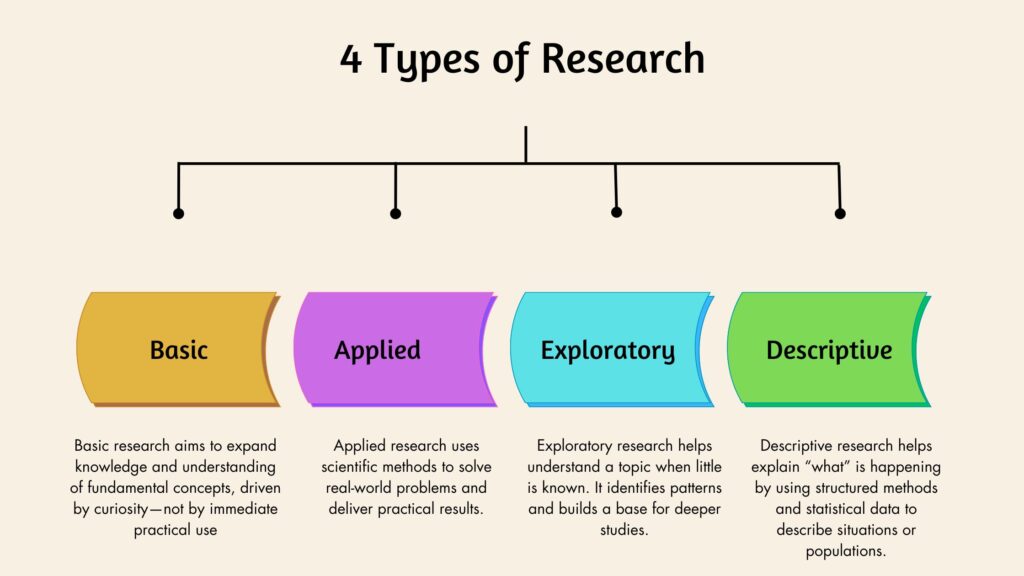Research Types in PhD That Every Scholar Should Know – A Complete Guide for Scholars
Kenfra Research - Nandhini2025-07-15T12:01:25+05:30In the world of academic and scientific research, especially at the doctoral level, understanding the Research Types in PhD is just as crucial as selecting the right topic. Knowing what kind of research you’re conducting lays the foundation for your methodology, literature review, and eventual publication strategy. Whether you’re drafting a thesis, developing a research proposal, or simply trying to grasp the basics of research methodology, getting a clear idea of the different Research Types in PhD—namely Basic, Applied, Exploratory, and Descriptive—is essential for clarity and direction.
Each research type serves a unique purpose and helps answer different kinds of questions. Some focus on theory, others on real-world problems, while some help discover new patterns or describe existing conditions in detail. In this blog, we’ll break down the various research types in PhD in simple terms, with practical examples and suggestions, to help you figure out which approach best aligns with your study objectives and academic goals.

1. BasicResearch (Pure or Fundamental Research)
Definition:
Basic research is done to increase understanding of fundamental principles. It is driven by curiosity and a desire to expand knowledge rather than solve an immediate real-world problem.
Purpose:
To build theory and contribute to academic knowledge. It often lays the foundation for future applied research.
Characteristics:
- Focuses on general principles or laws.
- Not meant for immediate practical use.
- Conducted in labs or academic institutions.
- Uses scientific methods for accuracy and consistency.
Example:
- Studying how memory works in the human brain.
- Researching the behaviour of electrons in physics.
When to Use Basic Research:
- When you are exploring abstract ideas or concepts.
- When your goal is to create new theories or test existing ones.
2. Applied Research
Definition:
Applied research is conducted to solve a specific, practical problem using scientific methods. It is directly linked to real-world challenges and often results in usable outcomes.
Purpose:
To find solutions that can be applied immediately or used by industries, policymakers, or professionals.
Characteristics:
- Practical in nature.
- Often industry-driven or policy-focused.
- Results in new products, processes, or technologies.
- Often uses findings from basic research.
Example:
- Developing a new vaccine to fight a virus.
- Studying the effectiveness of online learning in rural schools.
When to Use Applied Research:
- When your research is designed to solve a specific issue.
- When working in collaboration with industries, governments, or NGOs.
3.Exploratory Research
Definition:
Exploratory research is used when the researcher has little or no information about a topic or problem. It is meant to gain familiarity, identify patterns, and set a base for more structured studies.
Purpose:
To explore a research problem without offering final conclusions. It’s often the first step before descriptive or conclusive research.
Characteristics:
- Open-ended and flexible.
- Often qualitative (interviews, focus groups, observations).
- Seeks to ask “what,” “why,” or “how” questions.
- Helps generate hypotheses for future study.
Example:
- Exploring why students drop out of online courses.
- Investigating consumer interest in a new product category.
When to Use Exploratory Research:
- At the beginning stages of your research.
- When trying to define the problem more clearly.
- When you don’t have much existing literature to rely on.
4. Descriptive Research
Definition:
Descriptive research is used to accurately describe a situation, event, or population. Unlike exploratory research, it is more structured and aims to answer the “what” question with statistical data.
Purpose:
To paint a clear picture of a topic by collecting and analysing data. It does not explain the cause behind a phenomenon but describes it in detail.
Characteristics:
- Often quantitative (surveys, questionnaires).
- Can be cross-sectional or longitudinal.
- Answers “what is happening,” not “why.”
Example:
- Surveying college students to find out how many hours they study daily.
- Measuring customer satisfaction after a product launch.
When to Use Descriptive Research:
- When you already have a defined problem.
- When you want to present data-backed insights.
- When you are reporting current trends or statistics.

How to Choose the Right Type of Research?
Ask yourself:
- Do I want to generate new theory or apply it to a real-world problem?
- → Basic = theory, Applied = real-world problem
- Do I know enough about the topic?
- → No = Start with Exploratory research
- Do I want to collect statistical data?
- → Yes = Go for Descriptive research
Final Thoughts
Understanding the types of research—Basic, Applied, Exploratory, and Descriptive—is crucial for building the right foundation for your academic or scientific project. Each type has its own purpose, process, and role in the broader research ecosystem. Identifying the right research types in PhD work helps ensure your study is well-aligned with your objectives.
By identifying which type suits your goal, you can:
• Design better research questions
• Choose the right methodology
• Align with your target journal or institution
Whether you’re just starting your research journey or revisiting your research plan, make sure you’ve got your research type sorted—it’s the first big step toward success.
Need Help with Research Design or Paper Writing?
At Kenfra Research, we assist scholars with:
- Research proposal development
- Journal paper writing
- Topic selection
- Literature review
- PhD guidance from start to finish
📞 Contact us: 6383377501
🌐 Visit: www.kenfra.in
Let us help you make your research journey easier and more impactful!








Leave a Reply